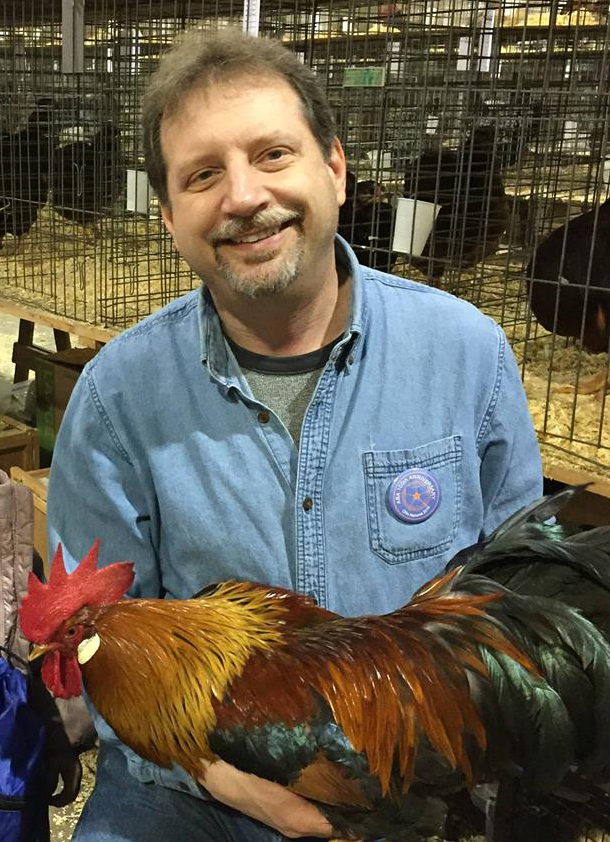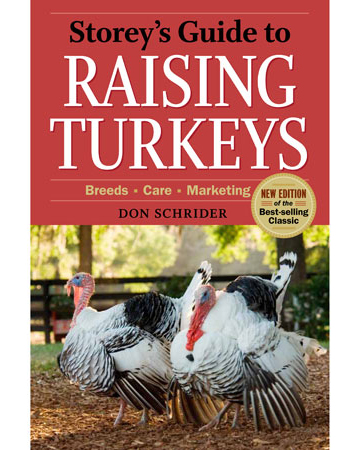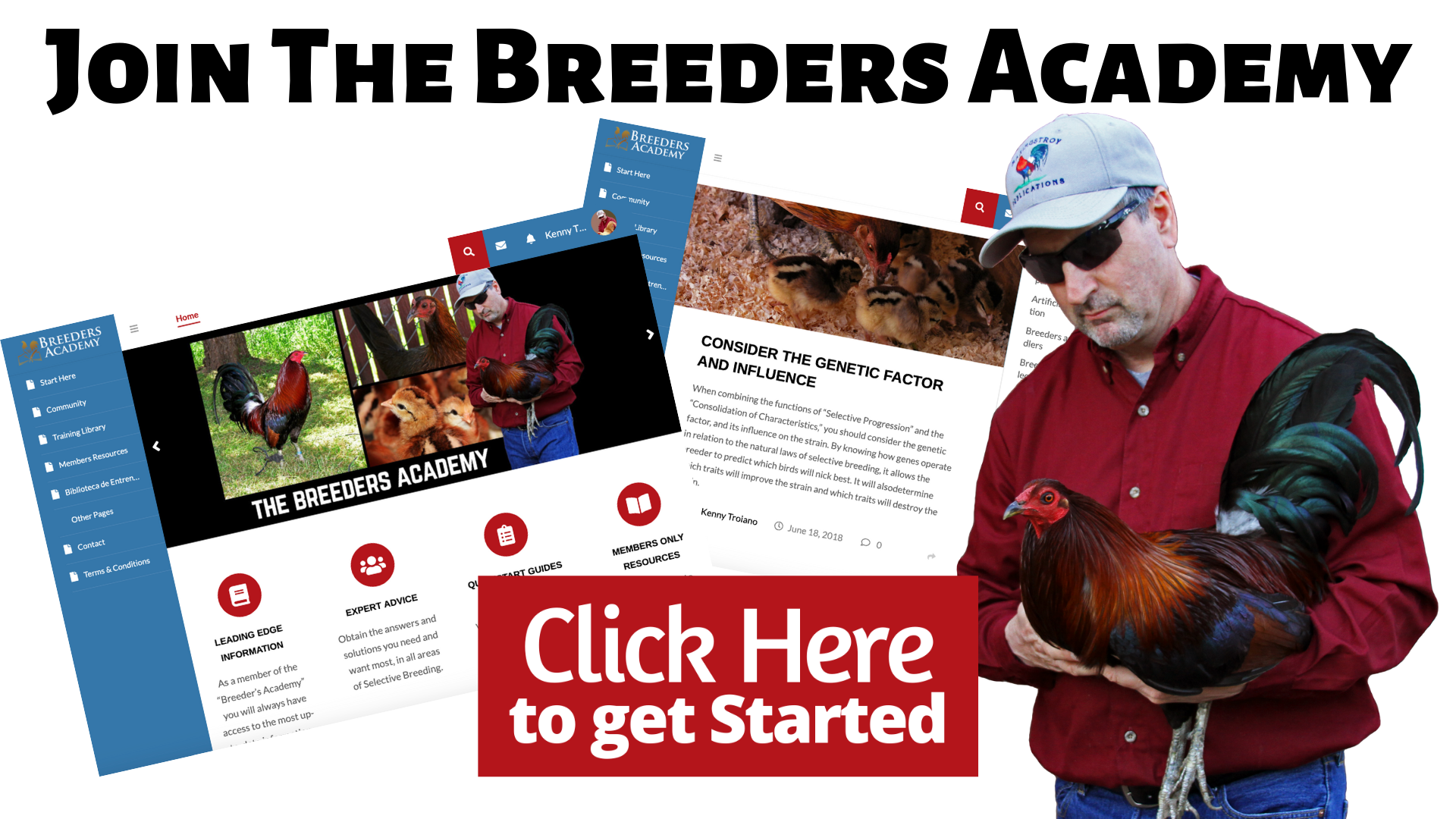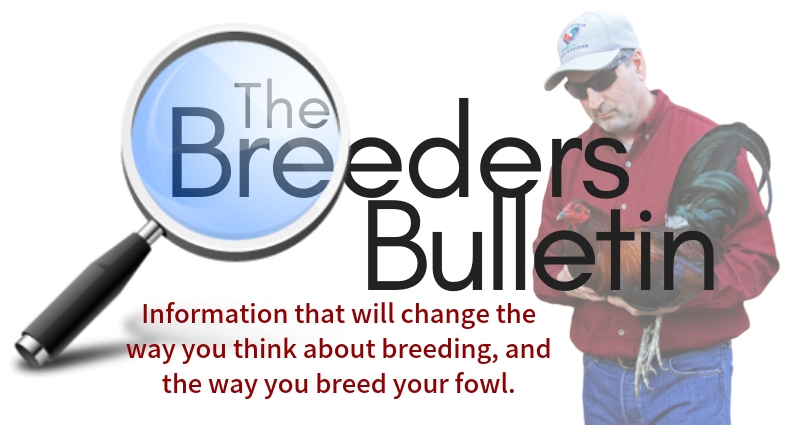I’m happy to have Don Schrider on the show.
He’s from West Virginia, and has written for many publications, such as Mother Earth News, Backyard Poultry, Countryside, the Poultry Press, and Chicken magazine.
Don has worked with “The American Livestock Breeds Conservancy” on heritage breeds, such as the Buckeyes. And, has not only renewed the interest of this incredible breed, but has helped preserve the breed for future generations. Almost lost to extinction, he has brought it back to life, so to speak, and is now a viable breed again.

Don Schrider is an author of the book, titled “Storey’s Guide to Raising Turkeys.” This book is packed with good advice, and I especially like the chapters on feeding, disease prevention and health care. But, it was the chapter on breeding that really caught my attention. His knowledge of breeding is above the fold. And, I recommend this book to all breeders.
I first heard of Don from Harvey Ussary, and the students of the Sustainable Poultry Network, where I taught The Art of Selective Breeding and the Laws of Inheritance. And, again from one of my Members of the Breeders Academy, Aaron Baker, which we interviewed on the Bred to Perfection Podcast. Aaron and the students of SPN had a lot of good things to say about Don and his knowledge of breeding.
Eventually, we became friends on facebook, and we would reach out to one another, from time to time, and make comments on each others posts.
I always wanted to have Don on the show. But it wasn’t until I got his book on Raising Turkeys, and read the chapter on breeding that I knew it was a must.
I would like to read a paragraph Don wrote. I wish I could remember where I found this.
“When I spend time watching the chickens there is an additional sensation – looking over birds with high caliber type and color is a visual experience that, for me, compares to the drinking a fine wine. I love the glossy feathers and rich colors. As my flock has grown in quality over the years, I have drawn more and more satisfaction from observing it. This satisfaction is perhaps enhanced, owing to the fact that I have produced my own stock for over twenty years now – each bird representing generations of my selecting decisions.”
I found this inspiring. And when I read this paragraph, I knew one day I would need to get Don on the show.
We are going to talk with Don about breeding, his work with Turkeys, and the Buckeyes. But Don is most well-known for his Brown Leghorns.
The discussion went so well, we talked for over 2 hours.
Therefore, I found it easier to separate this discussion into 3 parts, or 3 episodes.
In this episode, we talk about:
- His mentors and the benefits of having a mentor
- How it’s best to change your thinking. To improve your results in breeding, you must be willing to do things differently.
- Watching where you obtain your information, and just because they say it, doesn’t mean it’s true. This includes forums and Facebook.
- The importance of using proper breeding methods
- Why culling may be more important than breeding
- The benefits of reducing the gene pool.
- Using conservation breeding for maintaining the line.
- The benefits of Clan Mating.
- Understanding breeding tools, principles such as:
-
- Offsetting faults
- Intensify the good traits
- Emphasize vigor
- The 3 Tests:
- The pedigree test
- The sib test
- And the progeny test
- The Law of 10
- A breeding method, known as Recumbent Reciprocal Selection.
- Hen Fever! The problem with bringing in new birds.
- Breeding methods, such as – rolling matings, spiral matings, mating old to young.
- How to improve fertility.
- And so much more!

Although Don is a breeder of Leghorns (which is a domestic breed), and not a gamefowl breeder, don’t let this discourage you from listening. This information is good for all breeders.
I say it all the time – we gamefowl breeders can learn a lot from domestic chicken breeders, and domestic chicken breeders can learn a lot from gamefowl breeders. Yes, the breeds are different, and have different purposes, but the breeding methods and genetics are the same. The only difference is the traits we select and the purpose for which they are bred. Everything else is the same.
In fact, most of the greatest breeders I know are from the domestic side. Very few gamefowl breeders know what they are doing. Let me clarify this.They use crossbreeding as their only method of breeding, and their results are usually unpredictable and inconsistent. Just look of Facebook. I would not give most breeders 50 cents for their best fowl.
So keep an open mind and value the knowledge and advice of other types of breeders, because if you don’t, you are doing this at your own peril.
Breeding is a centuries old practice, one used by all types of breeders, for all types of animals. The only difference is the traits they select. The breeding principles and practices, the breeding programs and methods are the same.
I see it all the time, gamefowl breeders who are not getting the results they are looking for, and blaming it on outside sources. This is usually due to the fact that they rely on family and friends for advice, who also don’t know what they are doing either. They rely on old wives tales and superstitions, and not scientific facts and proven breeding principles and practices.
This is extremely evident when I hear comments such as:
- Conformation of body does not matter.
- The only thing that matters is winning.
- Gameness is everything.
- I only breed the best to the best.
- There is no such thing as pure.
- Etc.
As you listen to this show, and others, I urge you to open your mind. Take it in, and really think about the information you are listening to. I’m sure you will find it interesting, practical and extremely valuable. This is true with everything I teach about breeding and improving your strains.
I have dedicated my life to helping breeders like you to advance your knowledge and skills as a breeder, and improve the quality of your fowl. My specialty is showing you how to create a true strain from mongrel flocks, or by creating a strain from unrelated cocks and hens.
This is accomplished by breeding a hen from one breeders and a cock from another breeder, and using proper breeding programs and knowing which birds to select each breeding season.
Very few are able to purchase or obtain high quality fowl from a great breeder. They are forced to start where they are or continue to purchase new birds each and every year.
I’m here to tell you there is another way. And that is what we teach at the breeders academy.
I have a Breeding Program, called the Founders Program, and many courses and resources that compliment this program. I can help you advance your knowledge about breeding, and advance your skills as a breeder and improve the quality of your strains.
With that said, I would like to encourage your to join the Breeders Academy.
Special note: the interview was by phone, so there are times when the reception is a little rough. You can hear and understand the confirmation, it will be best to listen to in a quiet place.
So, Sit back, take notes, and enjoy the show. I would love to hear your thoughts about what you have learned. And, let me know how you plan to take action.
Now, let’s get on with the show!

